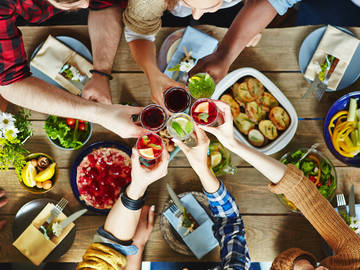Here in the U.S., we love our holidays—so much so that we've created some informal ones to sandwich in between the more traditional ones. We are currently in Friendsgiving season.

Though the term 'Friendsgiving' seems to be everywhere, it's surprisingly new.
The word Friendsgiving is, of course, a blend of friend and Thanksgiving, and it refers to a large meal eaten with friends either on or near Thanksgiving. People are serious about their Friendsgiving celebrations: there are how-tos, sample menus, rules, and even commandments for Friendsgiving. But when Friendsgiving first came into use, it was used to describe something much more informal than the traditional Thanksgiving meal.
First Use of Friendsgiving
The earliest known uses of Friendsgiving in print date to 2007, where it shows up in Usenet posts and on Twitter to refer without explanation to an informal meal with friends. (Several word detectives reported on a personal online photo album called "2004 Friendsgiving," but after some additional sleuthing on our part, we've determined that the album went online sometime in 2014, well after our earliest print use of Friendsgiving appears.) Given the fact that the word isn't explained in these posts and tweets, it's likely that Friendsgiving was floating around in spoken English for a bit before it showed up in written English—and this is pretty standard for new vocabulary.
Happy Friendsgiving Y’all!!!
—Usenet group (Friends of the Friendless), 4 Dec. 2007Because we all had so much fun this Friendsgiving we forgot to do secret santa.
—Usenet group (Friends of the Friendless), 14 Dec. 2007
The word slowly trickled into use as more and more people planned Friendsgivings. (It's worth noting that while the TV show "Friends" featured Thanksgiving episodes where the titular friends ate together, the word did not originate with the show.) Friendsgiving started showing up in edited prose fairly quickly after its appearance on the web: lifestyle pieces on Friendsgiving started showing up in 2008 and 2009.
But just because you can’t go home for the holidays doesn’t mean you have to be alone and leftover-less. Friends, coworkers, neighbors and “holiday orphans” can celebrate a fantastic “Friendsgiving” instead.
—Rebecca Ross, The Pensacola (Florida) News Journal, 27 Nov. 2008During recent years, [cookbook author Jane] Snow and some close pals have created "Friendsgiving." "We get together about two weeks before Thanksgiving and have some food and some fun," she says. "I always cook something, and everyone else pitches in."
— Joe Crea, The (Cleveland, Ohio) Plain Dealer, 18 Nov. 2009
But it really started coming into national prominence in 2011 when Bailey's Irish Cream used the word in an ad campaign and it became a plot point in The Real Housewives of New Jersey (the episode was, appropriately enough, called "Gobblefellas"). That began a steady uptick in use of Friendsgiving. And ironically, what began as an alternative to Thanksgiving has now become a second Thanksgiving, with all the commercial tie-ins of the original holiday. Nancy Friedman highlights a few from 2013, and notes that Butterball, purveyors of Thanksgiving birds, filed for trademark protection on the phrase "Butterball Friendsgiving."
Update: This word was added in January 2020.
Words We're Watching talks about words we are increasingly seeing in use but that have not yet met our criteria for entry.




